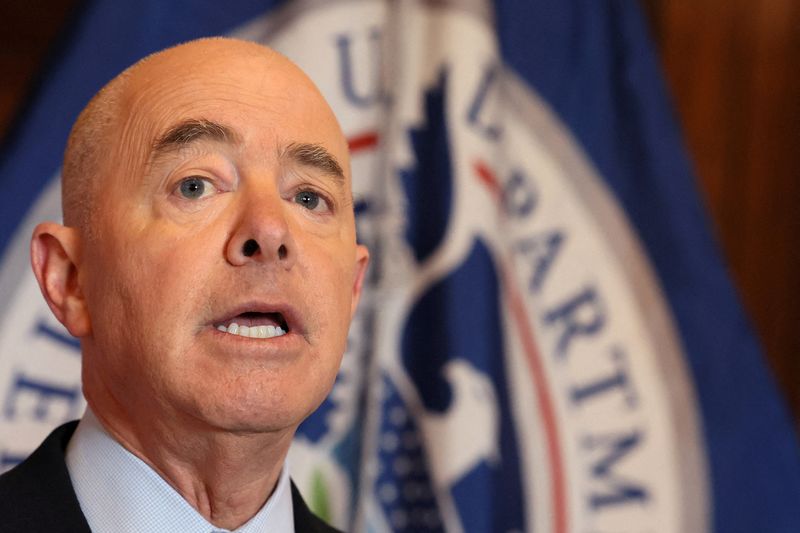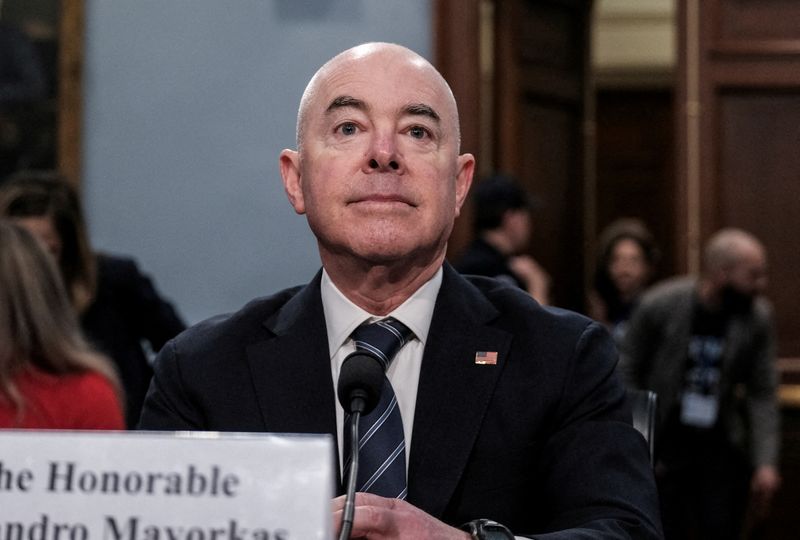By Richard Cowan, Makini Brice and Moira Warburton
WASHINGTON (Reuters) - The Democratic-majority U.S. Senate on Wednesday dismissed impeachment charges against President Joe Biden's top border official, bringing a swift end to an effort that House of Representatives Republicans launched months ago.
In a series of partisan votes, the Senate dismissed the charges accusing Homeland Security Secretary Alejandro Mayorkas of not enforcing U.S. border laws and lying to Congress, as illegal immigration has hit record levels since Biden took office in 2021.
Biden's Republican challenger in the Nov. 5 elections that will determine control of the White House and Congress, Donald Trump, has made the border a central focus of his campaign, and Reuters/Ipsos polling shows that immigration is a top concern among voters, and the top issue for Republicans.
Mayorkas denied wrongdoing, and the White House and congressional Democrats blasted the exercise as a misuse of the impeachment powers to highlight a policy dispute, rather than addressing the standard of "high crimes and misdemeanors."
"Once and for all, the Senate has rightly voted down this baseless impeachment that even conservative legal scholars said was unconstitutional," White House spokesperson Ian Sams said in a statement. He chastised House Republicans for staging "baseless political stunts while killing real bipartisan border security reforms."
Trump earlier this year helped kill a bipartisan Senate deal that would have imposed tough new limits on immigration.
House Speaker Mike Johnson, in a joint statement with fellow top Republicans, said "every single Senate Democrat has issued their full endorsement of the Biden administration’s dangerous open border policies."
The U.S. Border Patrol made more than 1 million arrests of migrants crossing the U.S.-Mexico border illegally in the past six months, according to internal agency statistics reviewed by Reuters, a pace similar to record-breaking totals during Biden's first three years in office.
Mayorkas, 64, is a former federal prosecutor who was born in Cuba. He left with his family in 1960 after Fidel Castro came to power. He maintains that the record numbers of migrants arriving at the U.S.-Mexico border over several months stem from Congress' inability to reform antiquated laws.
TUMULTUOUS EFFORT
The House effort to impeach Mayorkas was tumultuous, as an initial vote narrowly failed. A week later, with No. 2 House Republican Steve Scalise back from cancer treatment, Republicans won approval of the two articles impeachment on a 214-213 vote.
That was not the only impeachment effort bubbling in the conservative-led House, where Biden himself has been the target of an investigation that so far has failed to produce firm evidence that he broke any laws related to his family's past business dealings.
Top Senate Democrat Chuck Schumer engineered Wednesday's Senate outcome that protected Mayorkas from losing his Cabinet-level job by averting a trial in which senators were sworn in to judge the case.
Republican senators protested Schumer's move, insisting on a full-blown trial, and repeatedly sought delays when it became clear there would be no trial.
Top Senate Republican Mitch McConnell earlier had called for a "thorough consideration" of the charges against Mayorkas.

Disposing of the case without a trial, McConnell added in a Senate speech, "would mean running away both from our fundamental responsibility and from the glaring truth of the record-breaking crisis at our southern border."
The effort was just the second time in history that a member of a president's cabinet was impeached by the House. The last in 1876 involved President Ulysses S. Grant's secretary of war, William Belknap, over allegations of corruption. He was acquitted by the Senate.
